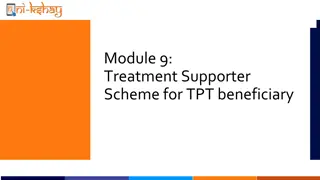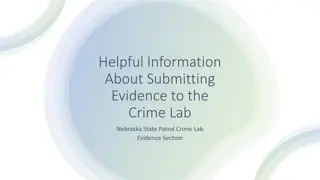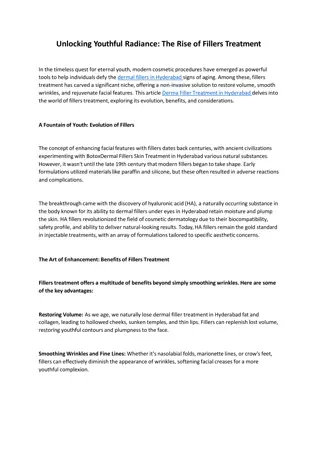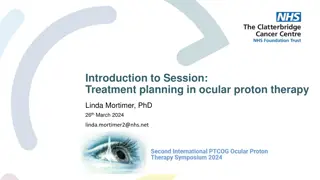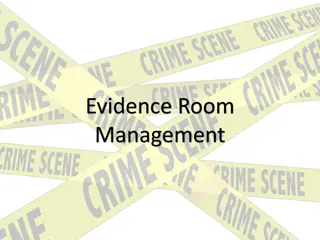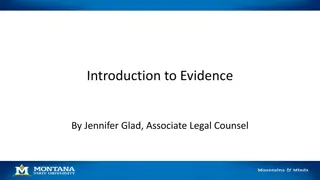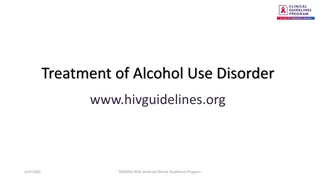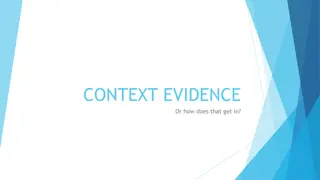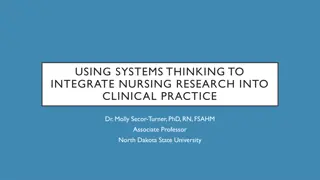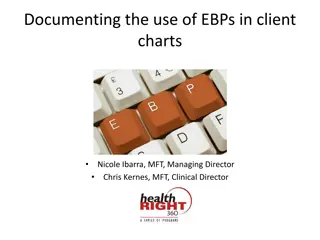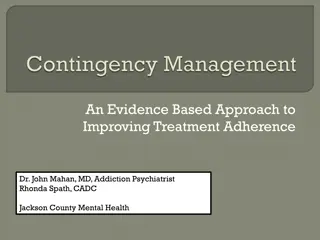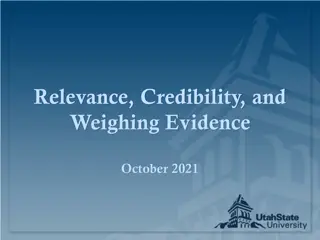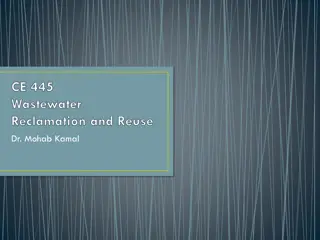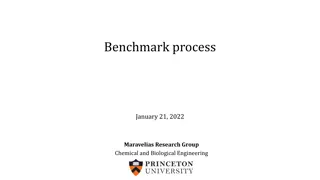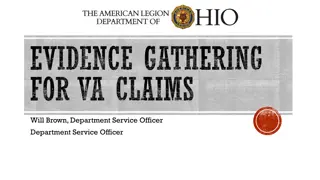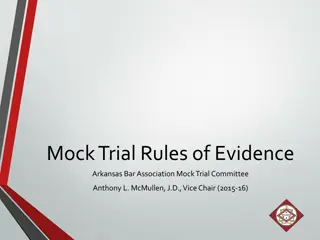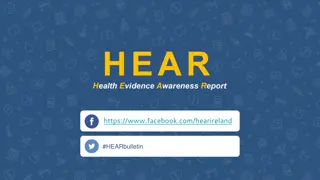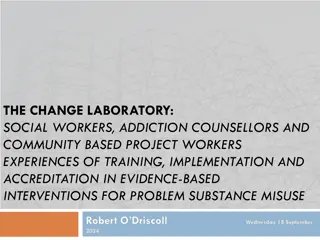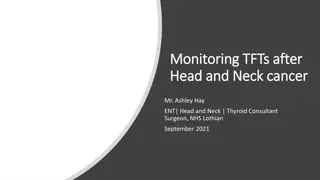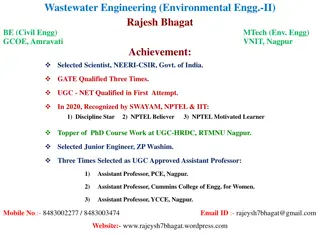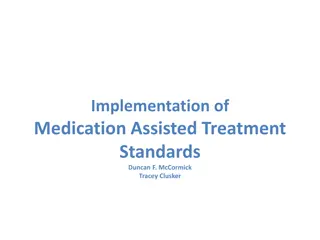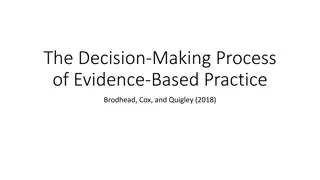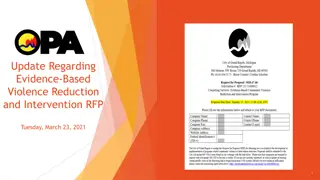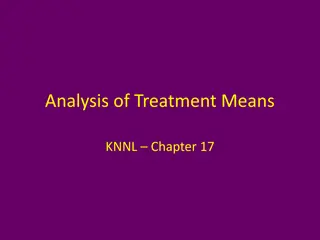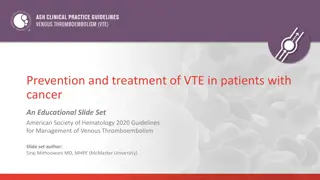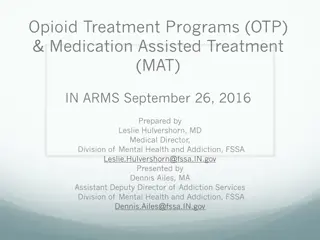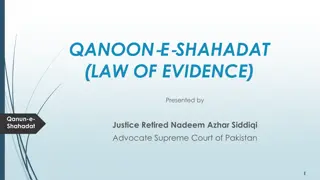Opioid Use Disorder Treatment Guidelines 2024
The February 2024 NYSDOH AIDS Institute Clinical Guidelines Program focuses on assisting clinicians in engaging with patients about opioid use disorder (OUD) treatment goals, emphasizing overdose prevention, providing updated information on available treatment options, and offering recommendations f
2 views • 24 slides
The Role of Artifacts and Evidence in Educator Evaluation and Support
Exploring the role of artifacts and evidence in educator evaluation, this content covers the three categories of evidence required by the Oregon Framework. It delves into the efficient process that reduces redundancy, essential components of SLG goals, and the types of evidence relevant to professio
0 views • 15 slides
Understanding Impression Evidence Collection in CSI Investigations
Impression evidence plays a crucial role in investigations, including shoeprints, tool marks, tire tracks, bite marks, and riffling marks on bullets. This evidence can be collected in 2D using photography or tape lifts, and in 3D through casting methods. Differentiating between class and individual
0 views • 21 slides
Treatment Supporter Scheme for Tuberculosis Preventive Treatment Beneficiaries
Treatment Supporter Scheme provides assistance to TPT beneficiaries in completing their treatment. Treatment Supporters can be various individuals including Medical Officers, MPWs, and community volunteers. Their role involves educating beneficiaries about TPT treatment, ensuring medication adherenc
1 views • 21 slides
Helpful Information About Submitting Evidence to the Crime Lab.
Helpful information about submitting evidence to the Nebraska State Patrol Crime Lab's Evidence Section. Learn about the NSP 750 Evidence Submittal Form, submission process, and guidelines for resubmissions. Ensure all necessary details are provided for proper analysis of evidence.
5 views • 16 slides
Cedar Recovery - Opioid Addiction Treatment Center Application in Knox County
Cedar Recovery is a nonresidential substitution-based treatment center focusing on opiate addiction in Knox County, Tennessee. With a strong emphasis on Office Based Opioid Treatment (OBOT) services, Cedar Recovery, led by reputable professionals like Dr. Stephen Loyd, aims to address the growing ne
4 views • 19 slides
Illegally obtained evidence
Illegally obtained evidence refers to evidence acquired through unlawful means, such as searches without warrants or extraction under duress. The Fruit of the Poisonous Tree doctrine renders evidence inadmissible if derived from illegally obtained evidence. The Exclusionary Rule prohibits the use of
2 views • 30 slides
Dermal Filler Treatment | Fillers Treatment in Jubilee Hills, Hyderabad
We offer best skin care treatment in jubilee hills, hyderabad. specialized in fillers treatment, injectible fillers treatment, we have top class dermatologist for dermal fillers treatment
0 views • 2 slides
Advances in Ocular Proton Therapy Treatment Planning
Explore the intricate world of ocular proton therapy treatment planning with Dr. Linda Mortimer, PhD. Discover the fundamental elements of an ocular treatment plan, main goals of treatment planning, an overview of dedicated ocular Treatment Planning Systems (TPS), planning workflows, choice of TPS,
2 views • 12 slides
Evidence Room Management
Explore the intricacies of evidence room management in a law enforcement setting, including the roles of individuals like Greg Van Buskirk, differences in crime scene management between large and small departments, the distinction between property and evidence, the importance of maintaining chain of
0 views • 8 slides
Understanding Evidence in Investigations
Learn about the principles and types of evidence in investigations, including inculpatory and exculpatory evidence, physical, documentary, demonstrative, and verbal evidence. Explore sources of evidence and the significance of collecting relevant information to ensure a fair investigative process.
0 views • 14 slides
Guidelines for Treatment of Alcohol Use Disorder
These guidelines aim to increase the number of clinicians offering evidence-based treatment for individuals with Alcohol Use Disorder (AUD), engage more New York State residents in treatment, reduce alcohol-related deaths, and promote a harm reduction approach. They address the prevalence of binge a
1 views • 18 slides
Understanding Context Evidence in Legal Proceedings
Context evidence in legal proceedings refers to evidence of acts not charged in the indictment, used to provide a background for understanding specific allegations. This type of evidence is often relied upon by the prosecution to explain events or behaviors that may seem isolated or surprising. It i
1 views • 13 slides
Integrating Nursing Research into Clinical Practice with Systems Thinking
Dr. Molly Secor-Turner emphasizes the importance of evidence-based practice (EBP) in nursing. EBP, derived from rigorous research, leads to quality patient outcomes by aligning services with current knowledge. The process involves identifying problems, critiquing evidence, implementing recommendatio
0 views • 21 slides
Effective Documentation of Evidence-Based Practices in Client Charts
Proper documentation in client charts is vital for tracking treatment progress and ensuring quality care. The Golden Thread method helps connect assessment, diagnosis, treatment plans, and progress notes, creating a cohesive treatment story. Progress notes should detail session topics, client progre
0 views • 14 slides
Advanced Treatment Processes for Faecal Sludge Management
Treatment processes for faecal sludge management involve various stages including preliminary treatment, primary treatment, secondary treatment, and tertiary treatment. Each stage employs mechanical, biological, and chemical processes to separate, decompose, and remove contaminants from the sludge,
0 views • 7 slides
Evidence-Based Strategies for Treatment Adherence Improvement
Explore evidence-based approaches like Contingency Management to boost treatment adherence in clients dealing with addiction. Learn methods to encourage meeting with clinicians, medication adherence, and abstaining from substances like methamphetamine. Emphasizing long-term benefits, the strategies
0 views • 29 slides
Understanding Evidence-Based Medicine and Clinical Decision-Making
European Patients Academy on Therapeutic Innovation emphasizes the importance of Evidence-Based Medicine (EBM) in providing optimum clinical care. EBM involves systematic review and utilization of clinical research for informed decision-making, benefiting patients in disease management and treatment
7 views • 20 slides
Understanding Relevance, Credibility, and Weighing Evidence in Decision-Making
Explore the importance of relevance and credibility in evidence assessment, the role of hearing panels in evaluating evidence fairly, and the responsibilities they hold. Learn about presenting relevant evidence, policy analysis, and identifying irrelevant evidence to ensure a thorough review process
6 views • 32 slides
Mastering Claims, Evidence, and Warrants for Persuasive Writing
Understanding the concepts of claims, evidence, and warrants is crucial for constructing persuasive arguments. Claims represent positions to persuade, evidence supports claims with facts, and warrants bridge the gap between evidence and claims. An exercise is outlined to help practice forming claims
0 views • 8 slides
Aquatic Treatment Systems for Wastewater Reclamation and Reuse
In aquatic systems, wastewater treatment involves bacterial metabolism and sedimentation, with aquatic plants playing a role in improving treatment capabilities. This article discusses the functions of aquatic plants in treatment systems and the categories of wetlands used for wastewater treatment,
1 views • 15 slides
Benchmark Process in Chemical and Biological Engineering Research Group
The benchmark process conducted by the Maravelias Research Group in Chemical and Biological Engineering focuses on wastewater treatment efficiency and performance metrics. The process includes various stages such as secondary treatment, preliminary treatment, primary treatment, disinfection, and bio
0 views • 7 slides
Understanding Biased Assimilation and Attitude Polarization in Social Disputes
People with strong opinions on complex social issues tend to interpret evidence in a biased manner, accepting confirming evidence readily while subjecting disconfirming evidence to critical evaluation. This can lead to increased polarization rather than narrowing of disagreement when exposed to the
0 views • 20 slides
Transformation of Quality Assessment Framework in Healthcare
The healthcare quality assessment framework is evolving with a new strategy focused on data-led, people's experiences, care integration, and safety culture. The current framework is transitioning towards a new approach by late 2023, incorporating separate registration and monitoring processes, five
0 views • 14 slides
Understanding Evidence Gathering for VA Claims with The American Legion Department of Ohio
Evidence is crucial for VA claims, and it can come in various forms such as documents, written statements, photos, and video recordings. The framework for evaluating evidence includes factors like relevance, competence, credibility, and weight. Understanding the types of evidence, forms of relevance
0 views • 14 slides
Understanding Mock Trial Rules of Evidence
Mock Trial Rules of Evidence are crucial for determining the admissibility of testimony and evidence in a trial setting. Students preparing for cases need to assess evidence admissibility, make timely objections, and be prepared to defend testimony. The rules cover objections, specific objections ty
0 views • 36 slides
Collaborative Efforts of Irish Health Librarians in Providing Evidence-Based Practice Support
Current awareness newsletter freely available on the internet, providing high-quality, relevant information to healthcare professionals and consumers. This collaboration of Irish health librarians aims to promote evidence-based practice by offering up-to-date information and resources. The conscient
0 views • 12 slides
Experiences of Training and Implementation in Evidence-Based Interventions for Substance Misuse
This study explores the experiences of social workers, addiction counselors, and community-based project workers in training, implementing, and accrediting evidence-based interventions for problem substance misuse. The research delves into the challenges faced, including funding for accreditation, a
0 views • 23 slides
Monitoring Thyroid Function After Head and Neck Cancer Treatment
This collection of images and data discusses the importance of monitoring thyroid function after head and neck cancer treatment, specifically focusing on post-treatment thyroid function tests, audits of practices in head and neck units, thyroid function post laryngectomy, and the significance of det
0 views • 11 slides
Comprehensive Overview of Wastewater Treatment Systems and Processes
This detailed profile showcases Rajesh Bhagat's extensive academic and professional achievements in environmental engineering, focusing on wastewater treatment. It covers various treatment processes such as secondary treatment, sludge digestion, preliminary treatment, and primary treatment. Referenc
0 views • 53 slides
Practice and Procedure in Judicial Review: Factual Evidence and Interveners
The content provides valuable insights into the practice and procedure regarding factual evidence and interveners in judicial review cases. It covers general rules, recent cases, applications for oral evidence, questioning witnesses, opinion evidence, and the role of interveners. Key points include
0 views • 28 slides
Implementation of Medication Assisted Treatment Standards and Phases to Evidence Implementation
The Medication Assisted Treatment (MAT) Implementation Support Team (MIST) aims to enhance local teams' capacity to implement MAT standards through various methods including clinical QI, evidence collection, information governance, and leadership. The evidence implementation involves three phases: s
0 views • 6 slides
Addressing America's Addiction Crisis: Shatterproof's Advocacy Efforts
Shatterproof, a national nonprofit founded in 2012, aims to reverse the addiction crisis in the United States by ending stigma, advocating for evidence-based policies, and ensuring treatment aligns with proven research. The organization's policy team is focused on advancing addiction treatment acces
0 views • 12 slides
Understanding Evidence-Based Practice in Behavior Analysis
Definitions and analogies from the field of medicine help clarify the concept of Evidence-Based Practice (EBP) in Behavior Analysis. EBP involves integrating current best evidence with clinical expertise and client values to make informed decisions. The three-legged stool analogy illustrates the imp
0 views • 32 slides
Update on Evidence-Based Violence Intervention RFP Process
The City of Grand Rapids initiated an RFP process to implement an evidence-based violence reduction program, involving a review committee that assessed proposals based on established models. The committee decided to re-release the RFP with a focus on an evidence-based intervention model, ultimately
0 views • 6 slides
Statistical Analysis of Treatment Means in Experimental Studies
The content discusses various statistical methods to analyze treatment means in experimental studies, including KNNL models, main effects plots, inference for individual treatment means, comparing two treatment means, and contrasts among treatment means. It covers topics such as parameter estimation
0 views • 25 slides
Guidelines for Prevention and Treatment of VTE in Cancer Patients
American Society of Hematology's 2020 guidelines address the prevention and treatment of venous thromboembolism (VTE) in cancer patients. Developed by experts, these guidelines focus on key clinical questions, evidence synthesis, and recommendations for managing VTE in this specific population. The
0 views • 47 slides
Structural Coupling between Science and Politics in Evidence-Based School Reform
This article by Gita Steiner-Khamsi explores the interplay between science and politics in evidence-based school reform, focusing on global public goods and the use of data and evidence in policy planning. It discusses the challenges and promises of evidence-based approaches, highlighting the comple
0 views • 17 slides
Understanding Opioid Treatment Programs and Medication-Assisted Treatment
Opioid Treatment Programs (OTPs) and Medication-Assisted Treatment (MAT) integrate behavioral therapy with medications for substance use disorders like opioid dependency. Combining medications with counseling offers a holistic approach to help individuals reduce or stop opioid use. The summary cover
0 views • 41 slides
Understanding Qanun-e-Shahadat: Law of Evidence in Pakistan
Qanun-e-Shahadat Order 1984 replaced the Evidence Act of 1872 in Pakistan, aiming to align the law of evidence with Islamic principles. This law is crucial for judicial proceedings, governing the admissibility of oral and documentary evidence, primary and secondary evidence, and resolving conflicts
0 views • 22 slides



